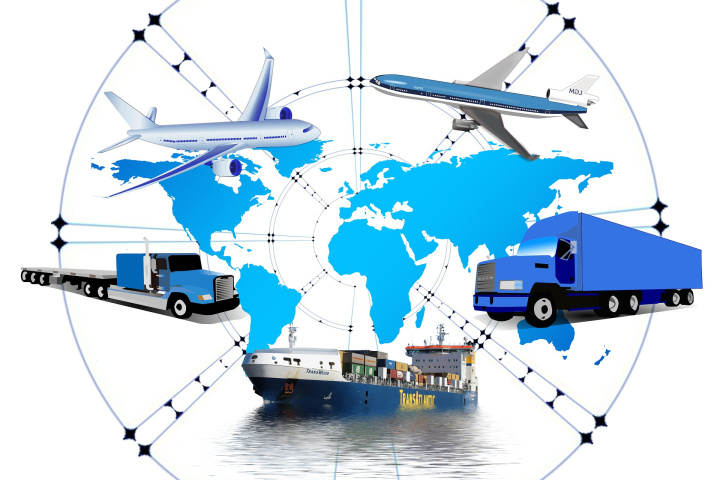What is Logistics: a Brief Reference for an Entrepreneur
Logistics is considered to be one of the most important components of modern commerce. It allows you to optimize and accelerate the delivery of goods and services to customers and thereby increase business profitability.
Content :
1 . What is logistics? What are its tasks?
2 . Types of logistics
3 . Logistics functions
4 . What is smart logistics and how does it help a business?
5 . Conclusion
In our new article, we will tell you about what the word “logistics” means, what goals and tasks it solves, what types and formats of this activity exist. We will also discuss effective approaches to logistics implemented by large companies, as well as describe the concept of "smart logistics" - what is it and why is it so in demand.
What is logistics? What are its tasks?
As you know, the term "logistics" refers not only to business, in a broader sense, it is the process of managing the movement of any material resources. Initially, this concept arose in the army quartermaster service back in the days of the Byzantine Empire and concerned the distribution of food.
In the twentieth century, logistics began to actively develop as one of the key business processes, and spread not only to food, but also to any other goods and services. Subsequently, it acquired a whole set of methods and tools to find the shortest, most convenient and rational way to deliver products from the place of manufacture to the final consumer. Experts in this industry help businesses build the necessary processes in such a way as to minimize costs and maximize profits.

As for the tasks of logistics, it solves a number of them. Namely:
- Ensuring the required quantity of goods, components for them and materials for their manufacture in the warehouse.
- Organization of processes of storage and preparation of products for delivery to customers: arrangement of storage facilities, control of the supply of goods from production sites to the warehouse, sorting, packaging, packaging, picking of goods, etc.
- Transportation of goods from a warehouse (or place of production) to points of sale or to the address of the final consumer (the so-called "door-to-door" delivery). This task of logistics is considered the main and most important, in the course of its solution, the choice of the mode of transport and route, the calculation of the optimal cost of cargo transportation, the search for the best delivery option, etc. occurs.
- Monitoring of current flights, which includes tracking the location of the cargo, interaction with drivers and forwarders, solving problems that arise along the way.
- Preparation of necessary documents and control of relevant processes in the course of international cargo transportation (customs clearance, DVIR compliance, etc.)
Types of logistics
When planning to learn what logistics is, it is necessary to take into account the wide variety of these activities. As a rule, the corresponding departments of logistics companies are responsible for each of them.

The main areas of logistics include:
Transport logistics
This is the classic and most well-known type of logistics, in most cases, when this process is mentioned, it is it that is meant. As mentioned above, the purpose of transport logistics is the planning, organization, routing and monitoring of the delivery of goods such as utilizing a telematics system from their place of production to the place of sale.
In this case, any possible modes of transport can be used, including road, sea, river, air, rail, etc. In addition, transport logistics includes other formats of services: multimodal transportation (using several modes of transport), container and refrigerated transportation, transportation of oversized, groupage or dangerous goods, etc.
Purchasing logistics
Procurement logistics is a set of measures to meet the needs of the business in the materials necessary for the conduct of the company's activities. The main task of this activity is to find and select the best suppliers of goods or services on which the effective operation of the company depends.
Sales logistics
Management of the planning and distribution of the goods and services produced by the company among various market participants, including wholesale buyers and end users. An important component of this direction is the so-called distribution channels - enterprises and entrepreneurs who deliver goods or services to their consumers.
Warehouse Logistics
Operational activity in this type of logistics is to optimize the processes of acceptance, processing, storage and shipment of goods in warehouses. This also includes activities for the organization of warehouse management, resource management (material, human, etc.) and work with goods. The main tools of warehouse logistics are special methods of cargo rotation, such as FIFO, LIFO, FEFO, FPFO, BBD, etc. Warehouse management information systems (WMS) have also become very popular in recent years.
Customs logistics
It is a set of measures for cross-border movement of goods with minimization of time and other costs for these procedures. The tasks of this type of logistics include the transportation of exported and imported goods, customs clearance, obtaining certificates for products, assessing the parameters of the cargo (condition, cost, compliance with customs standards), as well as escorting the cargo when crossing the border and further delivery to the destination.
Inventory Logistics
Another important component of the ABC of logistics is inventory logistics. It includes a range of solutions for product storage management and production volume control. With its help, companies can effectively control the process of placing and storing inventory in their warehouses and distribution centers.


Inventory logistics is considered one of the most important stages in the supply chain, and it affects both operations within the company and outside it. The key task of this type of logistics is to maintain a balance while maintaining the volume of stocks at an optimal level. Since its increase leads to an increase in costs, and its decrease leads to an increase in risks.
Production logistics
This type of logistics helps the business to ensure the production of goods of suitable quality in the required volume / assortment. Its main tasks are planning and management of business processes of the enterprise.
Integrated logistics
This is a system of measures for organizing the life cycle of a product from the moment of its production to the moment of consumption. Includes a management system for material, information, financial and other resources of the enterprise. Thanks to an integrated approach to logistics, a business can reduce or completely eliminate all the risks of uncertainty that negatively affect the payback of products.
Many logistics companies provide complex agency services, which include a number of areas: transport, customs, insurance, financial, contract, etc. With their help, customers are ensured prompt and uninterrupted delivery, as well as risk reduction, which (together with responsibility) is partially delegated to the agent.
Logistics functions
The main function of logistics is to plan the rational flow of goods and resources for their production. It consists of a number of intermediate functions that are performed by professional logisticians. In particular:
- Organization of the material resource management system of the enterprise by creating a system for coordinating its internal divisions with external participants in the process of production and supply of goods. Namely, suppliers of raw materials, warehousing services, wholesale distributors, retail outlets, etc.
- Ensuring the coordinated and efficient work of all participants in the supply chain, including supply and sales departments, warehouse, delivery, as well as third-party counterparties.
- Regulation of information and financial flows, which allows to ensure the smooth operation of the company.
The successful implementation of these intermediate functions helps the business to reduce costs, optimize the processes of supplying materials for production, as well as the delivery of the finished product to distributors and end users.
What is smart logistics and how does it help a business?
Today, logistics does not stand still, but is rapidly developing - powerful automation systems and robotics help it in this.

Modern programs and services are capable of automating literally any business processes in transport companies or relevant departments. This includes:
- Calculation of the profitability of cargo transportation.
- Creation and modification of applications.
- Management of mutual settlements with contractors.
- Organization of auctions and participation in them.
- Secure electronic document management between system participants.
- Operations analytics and reporting.
- Software tools for controlling the delivery of goods (automatic determination of the location of vehicles, sending and receiving orders, photo control, etc.).
Large corporations such as Amazon and Apple are doing a lot of work to develop and improve smart logistics. For example, Amazon, the world's largest online marketplace, is known for its powerful innovations in warehouse and delivery automation.
One of Amazon's key strengths is a computer-based worker management system that plans their schedules and work tasks with maximum accuracy, as well as their efficiency. Also among them is a very competent system for the movement of goods in all 90 large-scale warehouses of the company. Each product is assigned a unique alphanumeric barcode, it stores all information about the route of its delivery. After receiving the order, the system instantly finds the required product in the warehouse closest to the buyer and entrusts its processing to the employee who is closest to this product.
In addition, Amazon has implemented a system of deep analysis of routes and shipping methods, which is able to automatically calculate the shortest and most affordable shipping route for each item. This helps deliver orders to customers faster and reduces costs for the seller. Finally, another key factor in smart logistics from Amazon is the active introduction of robotics. It started this process in 2018 when it installed more than 100 loader robots in its warehouses, boosting goods handling productivity by as much as 22%.
Another successful example of implementing smart logistics technologies is Apple Corporation. It is known for its ideal supply chain, which is one of the company's key strengths, along with marketing and innovation in the development of new models of equipment.
Apple's success in logistics began back in the 90s, when it was led by the legendary Steve Jobs. In 1998, he paid air cargo carriers $50 million to ensure that the first shipments of iMacs were shipped quickly to their customers during the Christmas season. This allowed Apple to deliver its products faster than competitors, who then chose slower shipping by sea.
In 2010, Apple bought all the stock of high-resolution displays on the market for its iPhone 4, leaving its then-rival HTC without them. And in March 2011, when the supply of components from Japan fell after the devastating tsunami, Apple paid large amounts of prepayments to get them before competitors.
Conclusion
Logistics as a profession plays a very important role in organizing business processes in a global economy. It allows you to find the most convenient, fastest and least expensive way to deliver goods and services from their place of production to the final consumer. To date, there are a number of areas of logistics, including transport, marketing, customs, warehouse, production, complex, inventory logistics, etc. One aspect of logistics that often goes unnoticed is transportation, and a charter bus can be a great option for moving people and goods efficiently and safely.
The most important trend in this area is smart logistics - a set of measures to automate and robotize the processes of storage, processing and delivery of goods. The flagships of innovation here are large corporations (Apple, Amazon) that invest a lot of money in the development and improvement of their logistics.
Are you promoting your business online? Then you are surely faced with a lot of routine tasks. For example, upload leads from social networks to CRM, send notifications to customers about the delivery of goods, or copy contacts into spreadsheets.
So that you do not waste time on such tasks, we created the ApiX-Drive connector. It is a platform with which you can automate various business processes. Quickly and without the help of programmers. It is enough to register on the connector website, select the necessary services and configure their interaction. After that, ApiX-Drive will take over the routine, and you can spend time on more important tasks. Try it - it's not hard.

